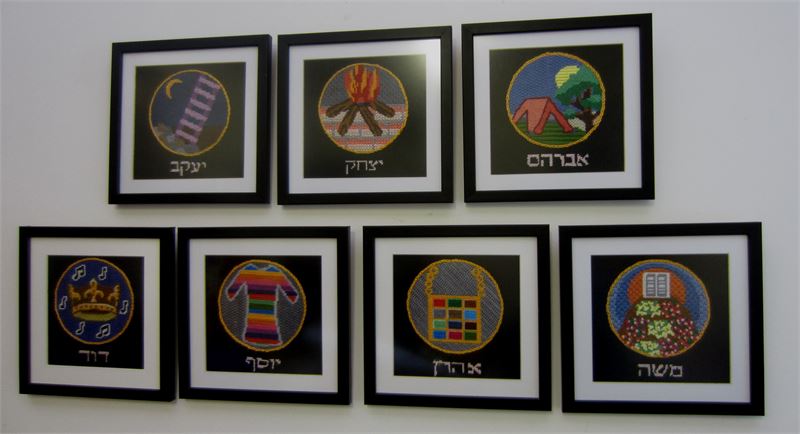Ushpizin
Posted By admin On 02/09/18Who and What Are the Ushpizin “Ushpizin” is Aramaic for “guests,” a reference to the seven supernal guests, “founding fathers” of the Jewish people, who come to visit us in the sukkah (the branch-covered hut in which we eat our meals throughout the festival of Sukkot), one for each of the seven days of the festival: • Day one: Abraham • Day two: Isaac • Day three: Jacob • Day four: Moses • Day five: Aaron • Day six: Joseph • Day seven: David Translated into English, the word “ushpizin” loses some of its mystery and otherworldliness. Yet these “guests” are indeed quite mysterious (at least until we learn more about them) and otherworldly (at least until we make them part of ours). We use the Aramaic term because our source of information about these mystical guests is from the Zohar, the fundamental Kabbalistic work written in that mystical language. Sukkot Guests Guests are an important part of the Jewish home all year round—there were even Jews who would never partake of a meal in their own home unless there was at least one guest, preferably a needy wayfarer, with whom to share it—but especially on Shabbat, and even more especially on the Jewish festivals ( Passover, Shavuot, Sukkot, Rosh Hashanah, etc.). On the festivals, there is a special mitzvah (divine commandment), “One who locks the doors of his courtyard, and... Does not feed the poor and the embittered soul—this is not the joy of a mitzvah, but the joy of his belly...”“You shall rejoice on your festival” (, and, our sages explain, the only true joy is shared joy. Indeed, the verse in full reads: “You shall rejoice in your festival—you, your son, your daughter, your manservant, your maidservant, the Levite, the stranger, the orphan and the widow who are within your cities.” In the words of Maimonides (Mishneh Torah, Laws of the Festivals 6:18): “When one eats and drinks, one must also feed the stranger, the orphan, the widow and other unfortunate paupers.

But one who locks the doors of his courtyard, and eat and drinks with his children and wife but does not feed the poor and the embittered soul—this is not the joy of a mitzvah, but the joy of his belly Epson Lq-300 Esc/p2 Driver Windows 7. ...” If guests are integral to festival joy, they are even more so to Sukkot. Sukkot is the festival of Jewish unity; in fact, the Talmud states that “it is fitting that all Jews should sit in one sukkah.” If this is logistically difficult to arrange, it should, at the very least, be implemented in principle. Hp Printer Software Support there. We cram as many guests as possible into our sukkah, demonstrating that we fully intend to implement the Jewish communal sukkah to the full extent of our ability, each in our own domain. There is even about a certain chassidic master who, because he lacked a guest, the Patriarch Abraham refused to enter his sukkah (why Abraham was there—more on that later). The Kabbalah of the Ushpizin And so we come to the ushpizin. As we fill our sukkah with earthly guests, we merit to host seven supernal guests.
Movies.com, the ultimate source for everything movies, is your destination for new movie trailers, reviews, photos, times, tickets + more! Canon I860 Driver Osx Windows 7. Stay in the know with the latest movie news and cast interviews at Movies.com. 36 ushpizin about the movie Set in an ultra-Orthodox neighborhood, this movie has entertainment value purely as the heartwarming tale of a holiday miracle during the Jewish holiday of Sukkot.However, this film also carries great significance as the first of its.
Epson Cx2800 Scanner Driver For Windows 7. While all seven ushpizin visit our sukkah on each of the seven nights and days of Sukkot, each supernal “guest” is specifically associated with one of the festival’s seven days, and is the “leading” or dominant ushpiza for that night and day. The Kabbalists Translated into English, the word loses some of its mystery and otherworldlinessteach that these seven leaders—referred to in our tradition as the “seven shepherds of Israel”—correspond to the seven sefirot, or divine attributes, which categorize G‑d’s relationship with our reality, and which are mirrored in the seven basic components of our character (man having been created “in the image of G‑d”). As each supernal “guest” graces our sukkah, he empowers us with the particular quality that defines him. This is the deeper reason that they are called the “shepherds of Israel,” for like a shepherd who provides nourishment for his flock, these seven leaders nourish us their spiritual essence: Abraham feeds us love; Isaac, self-discipline; Jacob, harmony and truth; and so on. And while these seven great souls are our “shepherds” all year round, the seven days of Sukkot are a time when their presence in our lives is more pronounced and revealed.